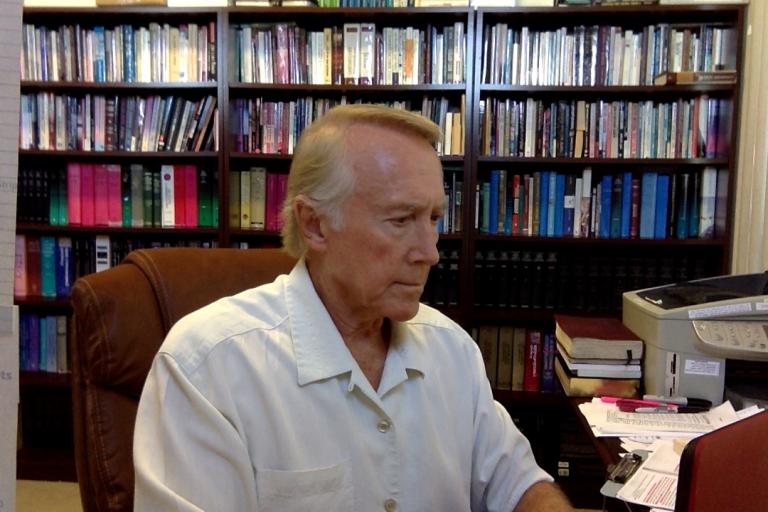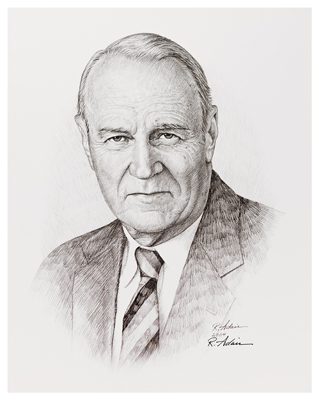My First Christological Discussion with Dr. S. Lewis Johnson—Section B
 I then asked Dr. Johnson about 1 John 4.15. It reads in the NASB, “Whoever confesses that Jesus is the Son of God, God abides in him, and he in God.” He replied, “Mormons and others say they believe that Jesus is the Son of God. But you must believe in the biblical meaning of the term Son of God to be saved, and they don’t because they don’t believe Jesus is God.” I have heard other Christians say that, including former Mormons who became evangelical Christians. I have questioned several Mormons about this and find that they don’t say that. Instead, they usually have pretty much affirmed the orthodox Trinity doctrine.
I then asked Dr. Johnson about 1 John 4.15. It reads in the NASB, “Whoever confesses that Jesus is the Son of God, God abides in him, and he in God.” He replied, “Mormons and others say they believe that Jesus is the Son of God. But you must believe in the biblical meaning of the term Son of God to be saved, and they don’t because they don’t believe Jesus is God.” I have heard other Christians say that, including former Mormons who became evangelical Christians. I have questioned several Mormons about this and find that they don’t say that. Instead, they usually have pretty much affirmed the orthodox Trinity doctrine.
For example, years earlier, in 1977, I invited Joe Collett (now Seve Ballesteros’ manager) to have dinner with me at Colonial Country Club during the PGA Tour’s Colonial Invitational in Fort Worth, Texas. We had a long talk about Jesus, mainline Christianity, and Mormonism. Joe is still the most informed Mormon with whom I have ever discussed these subjects, though Billy Casper is a close second. Later, Joe gave me the Mormon book, Jesus the Christ. It was authored by James Talmadge, one of the Twelve Apostles in the Church of Jesus Christ of the Latter-Day Saints (Mormon Church). Joe said Mormons regard it as the best book that sets forth Mormon beliefs about Jesus.
James Talmadge makes it clear in this book what Mormons believe. He says on p. 32, “We affirm that Jesus Christ was and is Jehovah, the Eternal One. The scriptures specify thee personages in the Godhead: (1) God the Eternal Father, (2) His Son Jesus Christ, and (3) the Holy Ghost. These constitute the Holy Trinity, comprising three physically separate and distinct individuals.” Of course, Trinitarians would object to the word “physically.” Talmadge further states that Mormons believe in the eternal preexistence of Jesus as the personal Word of God and his part in Creation. Talmadge often says Jesus Christ is God or Jehovah. In his main chapter on this subject, besides the word “physically,” only once did I detect anything that Trinitarians would object to. Talmadge (p. 32) calls the three members of the Trinity “Gods.” But this is no different from some Christian apologists of the second and third centuries who said Jesus and God the Father are “Gods/gods.” Origin had called the Logos “the second god.”
 I then mentioned 1 John 5.1 to Lewis. It says in the NASB, “Whoever believes that Jesus is the Christ is born of God, and whoever loves the Father loves the child born of Him.” Lewis responded, “But you must believe in a divine Messiah to be saved.” I affirmed, “I do.” I don’t recall that he explained how you must believe in a divine Messiah, except to mean that Messiah is God.
I then mentioned 1 John 5.1 to Lewis. It says in the NASB, “Whoever believes that Jesus is the Christ is born of God, and whoever loves the Father loves the child born of Him.” Lewis responded, “But you must believe in a divine Messiah to be saved.” I affirmed, “I do.” I don’t recall that he explained how you must believe in a divine Messiah, except to mean that Messiah is God.
Lewis then unequivocally stated that if I continued to believe what I was saying that I would be denying the deity of Christ so that I would end up believing only in the human nature of Christ, just like Unitarians do.
I asked Lewis about Jesus’ saying, “If you believe not on me, believe my works.” I was referring to John 10.38 (cf. 14.11), so I didn’t quote it exactly right. Jesus’ point seems to have been that if his opponents believed his works, it would lead them to believe in him. I then asked Lewis, “Doesn’t this mean if I believe in Jesus’ miracles and that He is a supernatural person come from heaven that I will be saved?” Lewis answered, “No, that is not enough. Angels are that, and they can do miracles.”
I thought afterwards that my question was incomplete. But I had made it clear what I believed. Lewis added, “Besides, the Antichrist will do miracles.” I then reminded him of a past conversation we had in which he said he differed with Hal Lindsey. He had claimed that the devil and the Antichrist could do supernatural acts. Lewis had said that was incorrect, that they could only deceive people into thinking they did miracles.
Lewis then backed off, saying the devil and the Antichrist could only cause people to think they performed miracles. Only seconds later, Lewis mentioned Jesus’ healing of the paralytic and forgiving of his sins, related in Mark 2.1-12 (and parallels). Lewis said this miracle proved Jesus’ deity. At this point, with all due respect, I thought Lewis sounded confused. I had never heard him say that Jesus’ miracles proved his deity. The problem with this argument is that according to the Bible, Old Testament prophets and Jesus’ apostles did miracles.
Lewis then said, “What about Titus 2.13? How can you get around this?” I knew that most Bible versions translate the one-person view, “our great God and Savior, Jesus Christ,” which identifies Jesus as God. But some versions do not. For instance, the King James Version translates it, “the great God and our Savior Jesus Christ,” which is a two-persons view which does not identify Jesus as God. Instead, I cited Marshall’s Interlinear Greek-English NT, which renders it as the KJV, “the great God and our Savior Jesus Christ,” thus the two-persons view which doesn’t identify Jesus as God.
Lewis replied exasperatingly, “You are as wrong as you can be!” He then explained that the Greek text has one article with two nominatives and that this grammar must be understood as identifying a single person, thus Jesus being God. At this time, I didn’t know any Greek, yet I was speaking to an outstanding Greek scholar. Since Lewis was also an ardent golfer, he added this metaphor, “Like in golf, you are taking five strokes and only counting three.” Lewis then said of Marshall and such scholars who translate the two-persons view of NT texts such as Titus 2.13, “The only reason they translate that way is because of their prejudice.” (Sometime later, I visited Lewis in his home and discussed this subject again. I mentioned the famous Greek grammarian Winer, in which he says the Greek grammar of John 1.1c does not say the Logos is God.)
My Christological Journey (Part 7 of 12)
………………..
To see a list of titles of 130+ posts (2-3 pages) that are about Jesus not being God in the Bible, with a few about God not being a Trinity, at Kermit Zarley Blog click “Chistology” in the header bar. Most are condensations of my book, The Restitution of Jesus Christ. See my website servetustheevangelical.com, which is all about this book, with reviews, etc. Learn about my books and purchase them at kermitzarley.com. My books are: The Gospels Interwoven (1987); Palestine Is Coming: The Revival of Ancient Philistia (1990); The Third Day Bible Code (2006); The Restitution of Jesus Christ (2008); Warrior from Heaven (2009); Solving the Samaritan Riddle: Peter’s Kingdom Keys Explain Early Spirit Baptism (2015).
















